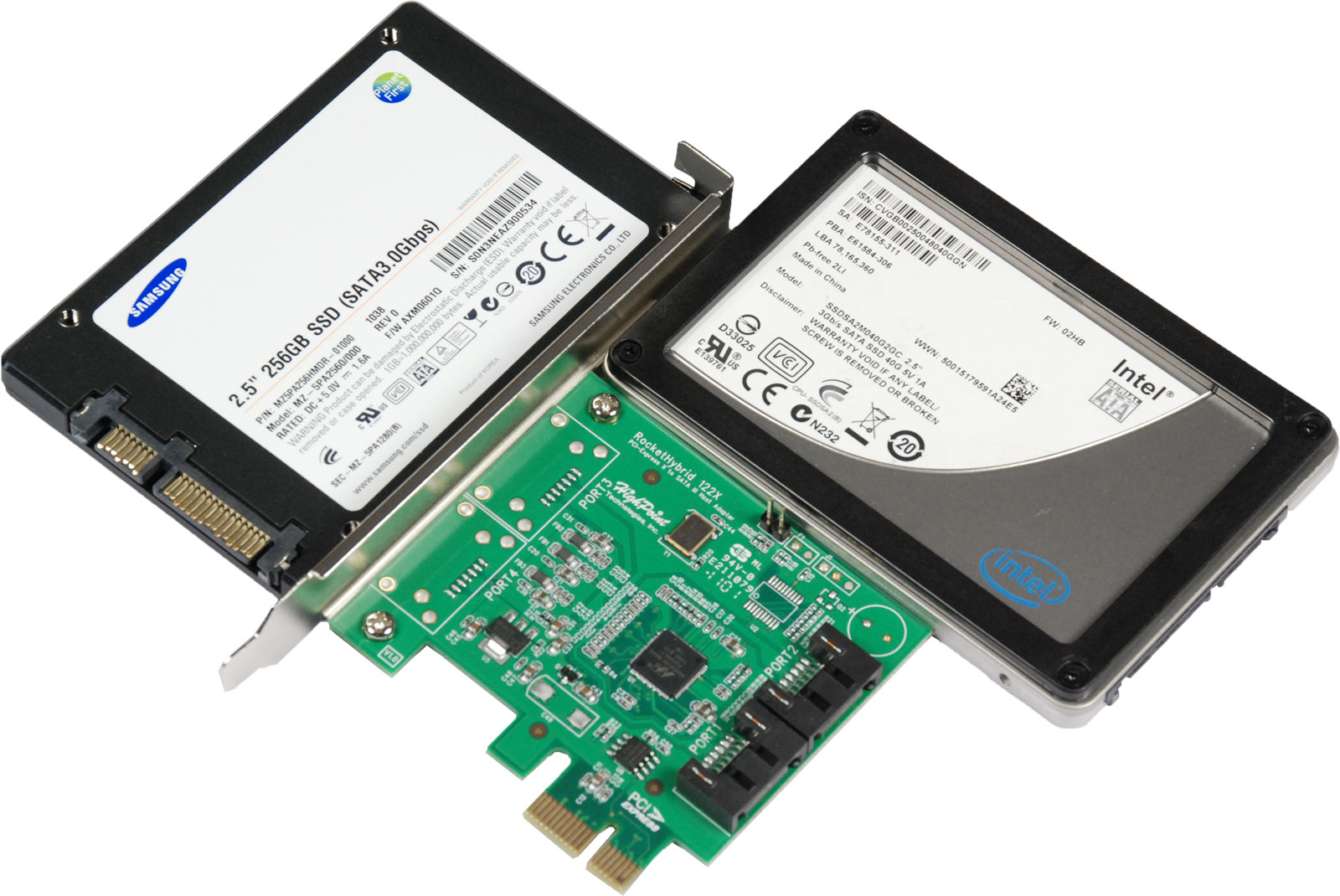SSD Caching (Without Z68): HighPoint's RocketHybrid 1220
Intel plans to offer its SSD caching functionality on the upcoming desktop Z68 platform, and only that platform. HighPoint’s RocketHybrid solution claims to achieve the same functionality, and it’s available as a PCI Express add-in card for only $59.
Conclusion
HighPoint’s RocketHybrid 1220 card is an interesting product, as it offers good value at a MSRP of only $59. We found that you can get a noticeable and sometimes really impressive performance jump when adding this controller card and literally almost any SSD to your system. However, it elevates storage performance into SSD spheres only in a few benchmarks, and therefore it clearly is an upgrade product suitable for users that want to speed up their system at acceptable cost, while maintaining the high capacities of hard drives of up to 3 TB.
Users are looking at the $59 cost of HighPoint’s controller plus the cost for a suitable SSD. We tried a 256 GB Samsung PM810 drive and decent performance, but found that a 40 GB entry-level drive such as Intel’s X25-V at $100 enables most of the performance increase at a fraction of the cost. Therefore, we recommend to either go after a serious SSD for serious money and use it as a standalone device, or to consider the path suggested by HighPoint. This is possible at roughly $150 total cost. It improves application performance, works without a need to reinstall your operating system, and the setup can be rolled back whenever you want. Thanks to AHCI compliance, you don’t even need any special drivers if you already have Windows Vista SP2 or newer.
You could consider spend the same money on an SSD device, but this would mean leaning on a 64 GB boot drive armed with performance that can't stand up to the most popular 128 and 256 GB models. Another option would be creating a RAID 0 setup using two fast 7200 RPM drives. With that said, we don’t believe this is a very smart option due to the increased risk of defects and data loss.
Intel’s new Z68 Express chipset with built-in SSD caching will be available shortly. Very shortly. We’re curious to see what type of performance increase will be possible on that platform with caching built-in as a value-add. But while you’d have to build an entirely new PC to take advantage of the Z68’s abilities, Highpoint enables SSD caching for almost any system built within the last couple of years.
A Parting Shot From Chris Angelini
Prior to publishing the Web's first performance preview of Intel's Z68 Express platform (Intel Z68 Express Chipset Preview: SSD Caching And Quick Sync), I asked Tom's Hardware readers (via my Twitter page) whether they'd prefer a caching solution that helped improve read performance automatically, or if they'd rather use a smaller solid-state boot drive with a larger hard drive, and manage their capacities manually. Unanimously, the answer was that power users would rather have control over the data that lives on solid-state and mechanical storage.
This makes sense. After all, most SSDs offer notable read and write performance benefits. When you drop in an SSD to do caching duties, its write-speed advantage doesn't get realized. Bear in mind that, on the desktop, caching works well as a fire-and-forget technology. Most enthusiasts have a few programs they'd like to see benefit from solid-state storage, though, and everything else can go on a mechanical drive without much worry. That's why, personally, I'd be most inclined to spend the extra money upgrading from a 40 GB SSD for caching to something with at least 80 GB, using that as dedicated solid-state storage, and pile everything else on a one or two terabyte hard disk. That's me, though. And it sounds like at least a fair-sized proportion of the Tom's Hardware audience would do the same.
Get Tom's Hardware's best news and in-depth reviews, straight to your inbox.
Current page: Conclusion
Prev Page Benchmark Results: PCMark Vantage Storage Tests